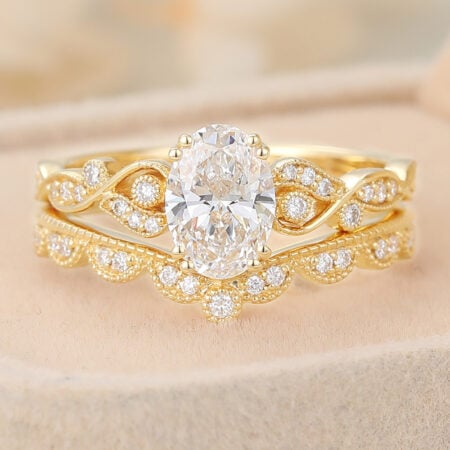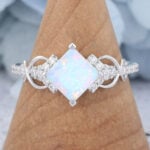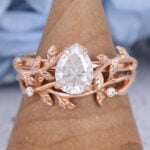Do Diamonds Scratch? The Truth About the World's Hardest Gem
Diamonds are celebrated as the hardest natural material on Earth, often seen as unbreakable symbols of love and strength. But even with a top rating of 10 on the Mohs hardness scale, many people still wonder: do diamonds scratch? While they’re incredibly resistant to damage, that doesn’t mean they’re completely immune. In this article, we’ll explore what it really takes to scratch a diamond, how to protect yours, and why hardness isn’t the whole story.
Why Diamonds Are Considered the Hardest Natural Substance?
Diamond hardness is well known for ranking at the very top of the Mohs hardness scale, with a maximum rating of 10 (on a scale from 1 to 10). While this clearly reflects their high hardness and strong ability to resist scratching, it doesn’t necessarily mean diamonds have excellent resistance to impact or fracturing. So, although diamonds are the hardest natural substance in the world, they are not the toughest.
What truly makes diamonds the hardest material in nature is their atomic structure. Diamonds are made of carbon atoms, and each carbon atom forms strong covalent bonds with four other carbon atoms. This three-dimensional arrangement results in an extremely rigid structure. Scientifically, this hardness is classified as a Mohs hardness of 10, the highest among all natural minerals, meaning that very few natural materials can scratch a diamond’s surface.
Do Diamonds Scratch?
While diamonds are incredibly hard, that doesn’t mean they’re completely scratch-proof. So, do diamonds scratch? The answer is: theoretically, only diamonds can scratch diamonds. While few natural substances can leave marks on a diamond’s surface, with a Mohs hardness of 10, direct contact and friction between diamonds can still cause minor scratches.
In real life, this often occurs when multiple pieces of diamond jewelry aren’t properly separated. For example, placing several diamond rings in the same jewelry box can create minor friction between them, leading to surface scratches. While these scratches are typically shallow and won’t affect the diamond’s structural integrity, they can affect its brilliance and appearance at certain angles. Therefore, even though diamonds are incredibly hard, careful care during daily wear and storage is crucial.
Do Lab Grown Diamonds Scratch?
Although grown in a laboratory to simulate the growth environment of natural diamonds, lab-grown diamonds possess the same structure, composition, and physical properties as natural diamonds, making them genuine diamonds. This means that lab-grown diamonds are virtually impossible to scratch with anything other than diamond. Therefore, in everyday use and wear, lab-grown diamonds perform just as well as natural diamonds in terms of wear resistance and durability.

Lab-Grown vs. Natural Diamonds: Any Difference in Scratch Resistance?
Lab-grown and natural diamonds share the same crystal structure and hardness, meaning they perform equally in a diamond scratch test. Both rate 10 on the Mohs scale and can only be scratched by another diamond. There’s no difference in scratch resistance between them.
What Can Scratch a Diamond?
Diamonds are extremely hard, ranking 10 on the Mohs scale, but they are not completely impervious to scratches. In most everyday situations, only another diamond is hard enough to scratch a diamond, which is why care must be taken when storing multiple diamond pieces together. However, in specialized industrial or scientific settings, certain synthetic materials—such as cubic boron nitride or advanced nano-engineered surfaces—may have the potential to mark a diamond under specific conditions. While this is rare and unlikely in daily life, it shows that diamond hardness, though unmatched in nature, is not absolute in all environments.
Can Diamond Scratch Diamond?
Lab-grown diamonds and natural diamonds share identical crystal structures and hardness, so they can scratch each other just like two natural diamonds would. In controlled tests, when a lab-grown diamond is rubbed against a natural diamond, fine scratches or abrasions can appear on both surfaces. This mutual scratching highlights that hardness is a material property independent of origin, making proper storage and handling essential regardless of diamond type.
Diamond Hardness vs. Toughness
Diamond hardness refers to its ability to resist scratching and rates a perfect 10 on the Mohs scale. However, hardness is different from toughness, which measures resistance to breaking, chipping, or cracking. Although diamonds are extremely hard, they have moderate toughness, meaning they can still chip or fracture if struck hard or at certain angles. Understanding this difference is key to properly caring for diamond jewelry.
How Scratches Affect a Diamond's Appearance?
Scratches on a diamond’s surface, though typically very fine, can impact its brilliance and sparkle by disrupting how light passes through the stone. Even minor abrasions may cause dull spots or reduce the sharpness of reflections, affecting the overall visual appeal. While scratches usually don’t compromise the diamond’s structure, they can lower its aesthetic quality and, in some cases, slightly decrease its value.
How to Prevent Diamond Scratches?
To prevent diamond scratches, follow these tips:
- Store diamond jewelry separately in soft pouches or compartments to avoid contact with other diamonds.
- Remove diamond rings during heavy physical activities or when handling rough materials.
- Clean diamonds gently using a soft cloth and mild cleaning solutions.
- Avoid exposing diamonds to harsh chemicals that could damage their setting.
Can Scratches on Diamonds Be Removed?
Minor scratches on diamonds can often be removed through professional polishing. Jewelers carefully buff the diamond’s surface to restore its smoothness and brilliance. However, polishing removes a small amount of the diamond’s material, which may slightly affect its weight and cut precision. For deep scratches or chips, more extensive repairs might be needed. It’s best to consult a trusted jeweler to assess the damage and recommend the appropriate treatment.
Conclusion
In summary, when asking whether do diamonds scratch, the answer is that diamonds are extremely resistant but not completely scratch-proof. Only diamonds themselves or very rare materials can leave marks. With proper care and storage, your diamond can maintain its brilliance for a lifetime. Understanding this helps you better protect and enjoy the world’s hardest natural gem.
FAQs About Do Diamonds Scratch
How hard is a diamond?
A diamond is the hardest natural scratching stone, rated 10 on the Mohs scale.
Can diamonds get scratched?
Diamonds can get scratched only by another diamond or materials of equal hardness.
Can you scratch a lab grown diamond?
Lab grown diamonds have the same hardness as natural diamonds and are equally resistant to scratches.
What does a scratched diamond look like?
A scratched diamond may show dull or cloudy spots that reduce its sparkle and brilliance.
Can moissanite scratch?
Moissanite is very hard but slightly softer than diamond and can be scratched by diamonds.
Will a diamond scratch glass?
Yes, diamonds are hard enough to easily scratch glass surfaces.
Can glass scratch a diamond?
No, glass is much softer and cannot scratch a diamond.
Can diamonds chip? Will diamond break?
Despite their hardness, diamonds can chip or break if struck hard or at certain angles.
Can you crush a diamond?
Diamonds can be crushed under extreme pressure, but this requires forces far beyond everyday conditions.



